YM 2.1 - The Compassionate Society
First airtime BBC: 23 February 1981
Length: 30 minutes
| Cast | Crew | |||
| Jim Hacker MP | Paul Eddington | Studio lighting | Derek Slee | |
| Sir Humphrey Appleby | Nigel Hawthorne | Costume designer | Jackie Southern | |
| Bernard Woolley | Derek Fowlds | Make-up artist | Cheryl Wright | |
| BBC News reader | Robert Dougall | Cameraman | Reg Pope | |
| George (Jim's driver) | Arthur Cox | Film Editor | Alastair Mackay | |
| Sir Ian Whitchurch | John Barron | Video tape editor | Graham Sisson | |
| Brian Baker | Norman Bird (?) | Vision mixer | Joan Duncan | |
| Mrs. Rogers | Rosemary Frankau (?) | Film Sound | Ron Blight | |
| Billy Fraser | Stephen Tate | Studio sound | Alan Machin | |
| BBC reporter | Lindy Alexander (?) | Music | Ronnie Hazlehurst | |
| Title sequence | Gerald Scarfe | |||
| Production manager | Brian Jones | |||
| Design | Tony Burrough | |||
| Producer | Peter Whitmore | |||
| Writers | Antony Jay & Jonathan Lynn | |||
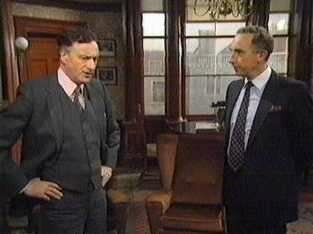 Plot: Jim Hacker has had a terrible day in Parliament: he is accused of giving misleading figures regarding the reduction in the number of administrators to the House. To save himself he had to agree to a full independent inquiry.
Plot: Jim Hacker has had a terrible day in Parliament: he is accused of giving misleading figures regarding the reduction in the number of administrators to the House. To save himself he had to agree to a full independent inquiry.
On his way to the Ministry he learns from his chauffeur that there is a new St. Edward's hospital in Northern London that is staffed with 500 administrators and ancillary workers, but has no doctors, nurses or patients. Jim Hacker is aghast and decides to ask Bernard to look into this.
At the Ministry Sir Humphrey is outraged that Jim Hacker agreed to a full independent inquiry. They both agree that this inquiry is not in their best interest and the inquiry should exonerate the department. Appointing Sir Maurice Williams as chairman of the inquiry should achieve this, since he is looking for a peerage. Bernard reports to the Minister that there are indeed no patients in St. Edward's hospital and that it has a staff of over 500 administrators and ancillary workers.
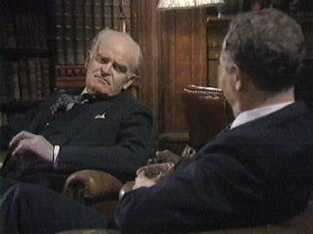 Sir Humphrey learns from the Permanent Secretary of the DHSS that it will take at least another 18 months before patients are admitted at St. Edward's. He makes sure that a militant union member called Billy Fraser is transferred to St. Edward's.
Sir Humphrey learns from the Permanent Secretary of the DHSS that it will take at least another 18 months before patients are admitted at St. Edward's. He makes sure that a militant union member called Billy Fraser is transferred to St. Edward's.
Sir Humphrey has an informal talk with the Union Secretary for the ancillary workers about the situation at St. Edward's. Sir Humphrey encourages the Union to take industrial action in case of layoffs because he wants to protect the jobs of the administrative civil servants at St. Edward's.
In a meeting with Jim Hacker, Sir Humphrey tries to convince the Minister not to layoff any workers at St. Edward's. Jim Hacker however wants to sack half of the personnel and use the money to get some doctors and nurses to start treating patients.
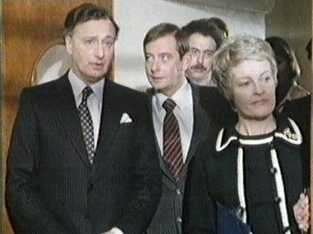 Jim Hacker visits St. Edward's hospital and he meets Billy Fraser. When he tells him he wants to layoff 300 people, Billy Fraser threatens to go on strike. Jim Hacker is not impressed by this since it will not harm anyone. In the evening news however he learns that all hospitals in the Greater London area are planning to go on strike. Number Ten is not pleased by this development and strongly advises Jim Hacker to solve it quickly.
Jim Hacker visits St. Edward's hospital and he meets Billy Fraser. When he tells him he wants to layoff 300 people, Billy Fraser threatens to go on strike. Jim Hacker is not impressed by this since it will not harm anyone. In the evening news however he learns that all hospitals in the Greater London area are planning to go on strike. Number Ten is not pleased by this development and strongly advises Jim Hacker to solve it quickly.
Sir Humphrey brings more bad news: the inquiry headed up by Sir Maurice Williams seems to be unfavorable to the DAA. It turns out that Sir Maurice is also chairing the Joint Committee for the Resettlement of Refugees and is more eager to find housing for 1,000 Cuban refugees. Then Jim Hacker puts two and two together: he can offer Sir Maurice Williams a brand new fully staffed hospital for the Cuban refugees. Sir Humphrey reluctantly agrees with this solution.
Rating (0-10): 7½
Top 5 Quotes:
 Jim Hacker: "The National Health Service, Humphrey, is an advanced case of galloping bureaucracy."
Jim Hacker: "The National Health Service, Humphrey, is an advanced case of galloping bureaucracy."
Sir Humphrey: "Ooooh, certainly not galloping. A gentle canter at the most." Sir Humphrey: "Minister, you said you wanted the administration figures reduced, didn't you?"
Sir Humphrey: "Minister, you said you wanted the administration figures reduced, didn't you?"
Jim Hacker: "Yes."
Sir Humphrey: "So we reduced the figures."
Jim Hacker: "But only the figures, not the number of administrators."
Sir Humphrey: "Well of course not."
Jim Hacker: "Well that is not what I meant."
Sir Humphrey: "Well really Minister, one is not a mind-reader, is one? You said reduce the figures, so we reduced the figures." [Discussing the opening up of St. Edward's hospital]
[Discussing the opening up of St. Edward's hospital]
Sir Ian Whitchurch: "First of all, you have to sort out the smooth running of the hospital. Having patients around would be no help at all."
Sir Humphrey: "They just be in the way." Jim Hacker: "Fortunately Bernard, most of our journalists are so incompetent that they have the gravest difficulty in finding out that today is Wednesday."
Jim Hacker: "Fortunately Bernard, most of our journalists are so incompetent that they have the gravest difficulty in finding out that today is Wednesday."
Bernard Woolley: "It's actually Thursday, Minister." Jim Hacker: "You think it [St. Edward's hospital] is functioning now?"
Jim Hacker: "You think it [St. Edward's hospital] is functioning now?"
Mrs. Rogers: "Minister, it is one of the best run hospitals in the country. It is up for the Florence Nightingale Award."
Jim Hacker: "And what is to praise that?"
Mrs. Rogers: "It is won by the most hygienic hospital in the area."
YM 2.2 - Doing the Honours
First airtime BBC: 2 March 1981
Length: 30 minutes
| Cast | Crew | |||
| Jim Hacker MP | Paul Eddington | Studio lighting | Derek Slee | |
| Sir Humphrey Appleby | Nigel Hawthorne | Costume designer | Jackie Southern | |
| Bernard Woolley | Derek Fowlds | Make-up artist | Cheryl Wright | |
| Sir Arnold Robinson | John Nettleton | Video tape editor | Sam Upton | |
| George (Jim's driver) | Arthur Cox (uncredited) | Vision mixer | Joan Duncan | |
| Master Baillie College | Frank Middlemass | Studio sound | Alan Machin | |
| Bursar Bailie College | William Fox | Music | Ronnie Hazlehurst | |
| Peter (civil servant) | John Pennington | Title sequence | Gerald Scarfe | |
| Civil servant | Margo Johns (?) | Production manager | Brian Jones | |
| Civil servant | Anne Maxwell (?) | Design | Dacre Punt | |
| Producer | Peter Whitmore | |||
| Writers | Antony Jay & Jonathan Lynn | |||
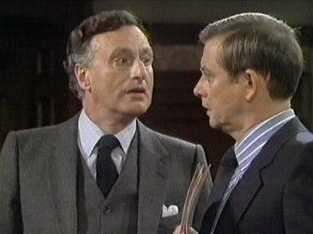 Plot: Jim Hacker is meeting with his department's expenditure committee. They cannot find any ways of cutting expenditures, except for overseas students that will start paying full tuition. After the meeting is over Bernard Woolley reminds the Minister that he still needs to approve the department's honours recommendations. Jim Hacker asks in despair how he can make civil servants want economies as much as they want honours. Then Bernard proposes only to award the honours to those civil servants that have cut their budgets by 5%. Jim Hacker thinks this is a brilliant plan.
Plot: Jim Hacker is meeting with his department's expenditure committee. They cannot find any ways of cutting expenditures, except for overseas students that will start paying full tuition. After the meeting is over Bernard Woolley reminds the Minister that he still needs to approve the department's honours recommendations. Jim Hacker asks in despair how he can make civil servants want economies as much as they want honours. Then Bernard proposes only to award the honours to those civil servants that have cut their budgets by 5%. Jim Hacker thinks this is a brilliant plan.
In a meeting with Sir Humphrey Jim Hacker launches this plan as his own, since Bernard absolutely does not want to take credit for it. Sir Humphrey is appalled and tries every argument against it...but unsuccessfully.
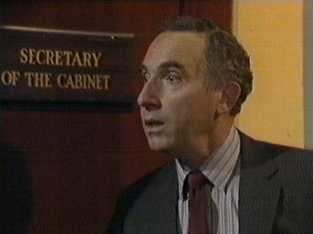 Furthermore, Sir Humphrey raises the issue of overseas students paying full tuition. He talked to Baillie College Oxford and they are expected to loose a lot of students. Again he tries all sorts of arguments to treat Baillie College as an exception but Jim Hacker is determined to keep this budget cut. He also finds out that Sir Humphrey is a graduate from Baillie College, and thus has a vested interest. Then Jim Hacker has to rush to the vote in the House.
Furthermore, Sir Humphrey raises the issue of overseas students paying full tuition. He talked to Baillie College Oxford and they are expected to loose a lot of students. Again he tries all sorts of arguments to treat Baillie College as an exception but Jim Hacker is determined to keep this budget cut. He also finds out that Sir Humphrey is a graduate from Baillie College, and thus has a vested interest. Then Jim Hacker has to rush to the vote in the House.
Sir Humphrey is summoned to the Secretary of the Cabinet, Sir Arnold. Sir Arnold is not pleased about linking honours to economies and the matter of the overseas students for Baillie College (he also graduated from Baillie College). Diplomatically he tells Sir Humphrey that he must solve these issues to save his career in the Civil Service.
Sir Humphrey arranges a high table dinner for Jim Hacker at Baillie College. At the dinner Jim Hacker gets very drunk. The Master of Baillie College tells Jim Hacker about the College's benefactors and how their names are remembered forever. Jim Hacker is not impressed by this. 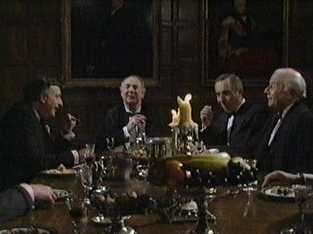 Then Sir Humphrey raises the issue of the honoree doctorates. The Master of Baillie College tells him they are still undecided whether an honoree doctorate of law should go to a judge or a politician. Jim Hacker, in a very fuddled state, argues that politicians deserve the credit, not judges.
Then Sir Humphrey raises the issue of the honoree doctorates. The Master of Baillie College tells him they are still undecided whether an honoree doctorate of law should go to a judge or a politician. Jim Hacker, in a very fuddled state, argues that politicians deserve the credit, not judges.
The next morning Sir Humphrey asks the Minister whether he would be interested in the honoree doctorate of law of Baillie College. Jim Hacker is very honoured but Sir Humphrey tells him it is still undecided.
Jim Hacker then tells Sir Humphrey that he would like to do something about the overseas students issue at Baillie College. But on the other hand he still needs to cut his budget. Sir Humphrey tells him that the budget cuts could be achieved if the plan for linking honours to economies is to be dropped.
In the following expenditures committee meeting it turns out that everyone has found a 5% budget cut. Jim Hacker happily approves the honours recommendations and Sir Humphrey indicates Jim Hacker is to receive the honoree doctorate.
Rating (0-10): 8½
Top 5 Quotes:
 (Talking about the abbreviations of the honours CMG, KCMG and GCMG)
(Talking about the abbreviations of the honours CMG, KCMG and GCMG)
Bernard Woolley: "Of course in the service, CMG stands for Call Me God. And KCMG for Kindly Call Me God."
Jim Hacker: "What does GCMG stand for?"
Bernard Woolley: "God Calls Me God." Jim Hacker: "How do people know they are on this [honours recommendation] list anyway? This file is marked strictly confidential."
Jim Hacker: "How do people know they are on this [honours recommendation] list anyway? This file is marked strictly confidential."
Bernard Woolley: "Oh Minister..."
Jim Hacker: "Silly of me." Jim Hacker: "When did a civil servant last refuse an honour?"
Jim Hacker: "When did a civil servant last refuse an honour?"
Bernard Woolley: "Well I think there was somebody in the Treasury that refused a Knighthood."
Jim Hacker: "Good God. When?"
Bernard Woolley: "I think it was 1496."
Jim Hacker: "Why?"
Bernard Woolley: "He had already got one." Bernard Woolley: "This M40 is a very good road."
Bernard Woolley: "This M40 is a very good road."
Jim Hacker: "So is the M4. I wonder why we got two really good roads to Oxford, before we got any to Southampton, Dover or Lowestoft or any of the ports?"
Bernard Woolley: "Nearly all our Permanent Secretaries went to Oxford, Minister. And most Oxford Colleges give very good dinners."
Jim Hacker: "And the Cabinet let them get away with it?"
Bernard Woolley: "Certainly not, they put their foot down. They said no motorway to take civil servants to dinners in Oxford, unless there was a motorway to take Cabinet Ministers hunting in the Shires. That's why when the M1 was built in the fifties it stopped in the middle of Leicestershire." Sir Humphrey: "There is no reason to change a system [the honours system] which has worked so well in the past."
Sir Humphrey: "There is no reason to change a system [the honours system] which has worked so well in the past."
Jim Hacker: "But it hasn't."
Sir Humphrey: "But...we got to give the present system a fair trial."
Jim Hacker: "Ah yes, I thought you might say that. It may interest you to know, Humphrey, that the Most Noble Order of the Garter was founded in 1348 by King Edward III. I think perhaps it may be coming towards the end of its trial period now, don't you?"
YM 2.3 - The Death List
First airtime BBC: 9 March 1981
Length: 30 minutes
| Cast | Crew | |||
| Jim Hacker MP | Paul Eddington | Studio lighting | Derek Slee | |
| Sir Humphrey Appleby | Nigel Hawthorne | Costume designer | Jackie Southern | |
| Bernard Woolley | Derek Fowlds | Make-up artist | Cheryl Wright | |
| Annie Hacker | Diana Hoddinott | Cameraman | Reg Pope | |
| Commander Forest | Graeme Garden | Film Editor | Alastair Mackay | |
| Walter Fowler | Ivor Roberts | Video tape editor | Graham Sisson | |
| Constable Ross | Michael Keating | Vision mixer | Joan Duncan | |
| Bodyguard | Colin McCormack | Film Sound | Ron Blight | |
| Bodyguard | Jay Neill | Studio sound | Alan Machin | |
| Music | Ronnie Hazlehurst | |||
| Title sequence | Gerald Scarfe | |||
| Production manager | Brian Jones | |||
| Design | Tony Burrough | |||
| Producer | Peter Whitmore | |||
| Writers | Antony Jay & Jonathan Lynn | |||
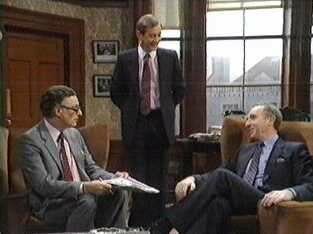 Plot: Private Eye - a political magazine - has revealed that Jim Hacker had been under secret surveillance while being in opposition. Furthermore, it has discovered that Jim's department is responsible for all bugging equipment, and this makes him the government's chief bugger. Jim Hacker is shocked by these revelations.
Plot: Private Eye - a political magazine - has revealed that Jim Hacker had been under secret surveillance while being in opposition. Furthermore, it has discovered that Jim's department is responsible for all bugging equipment, and this makes him the government's chief bugger. Jim Hacker is shocked by these revelations.
Sir Humphrey explains to him that he was put under surveillance because there were rumours before the elections that Jim Hacker might become State Secretary of Defense. Jim Hacker decides that if he is to be responsible for all bugging equipment, he is going to build in some real democratic safeguards. While in opposition he already set up a nationwide petition against electronic surveillance.
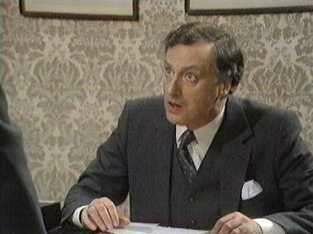 Later that night, Jim meets with Walter Fowler of the Express to leak his intentions on safeguards for electronic surveillance.
Later that night, Jim meets with Walter Fowler of the Express to leak his intentions on safeguards for electronic surveillance.
The next day Sir Humphrey learns that Jim Hacker's name is on a death list of the International Freedom Army. When he brings this news to the Minister, Jim Hacker starts to panic. The Special Branch briefs Jim Hacker on the routine safety precautions and the bodyguards that are assigned to protect him. Electronic surveillance will also be used to track down the International Freedom Army.
Now Jim Hacker has a change of heart regarding electronic surveillance, and argues that it is the government's main weapon against organized crime. He is therefore not pleased with his own petition on electronic surveillance that Bernard Woolley brings in. The petition is a great success; it has received over 2¼ million signatures.
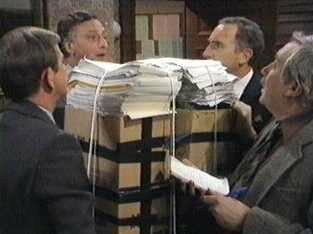 When Jim and Annie Hacker go away for the weekend, they are constantly surrounded by bodyguards and find it difficult to enjoy themselves.
When Jim and Annie Hacker go away for the weekend, they are constantly surrounded by bodyguards and find it difficult to enjoy themselves.
After the weekend, Jim Hacker has a meeting with Walter Fowler again. Fowler wants to get a response on the success of the petition on electronic surveillance. Jim Hacker does not want to embrace the petition.
Then Sir Humphrey has a quick word with the Minister and tells him that his protection has been canceled. Electronic surveillance has shown that Jim Hacker is no longer on the Freedom Army's death list because they think he is not important enough worth assassinating. Jim Hacker does not know whether to be happy with this or insulted. Anyway, now he shows Walter Fowler the petition and states that he is very pleased with it's success.
Rating (0-10): 9
Top 5 Quotes:
 Walter Fowler: "How would you like to be an informed source?"
Walter Fowler: "How would you like to be an informed source?"
Jim Hacker: "Okay....informed source."
Walter Fowler: "It's quite a joke really, isn't it? Describing someone as informed when his Permanent Secretary is Sir Humphrey Appleby." [Talking about the very successful petition on electronic surveillance]
[Talking about the very successful petition on electronic surveillance]
Bernard Woolley: "Shall I file it?"
Jim Hacker: "File it? Shred it!"
Bernard Woolley: "Shred it??"
Jim Hacker: "Nobody must ever be able to find it again."
Bernard Woolley: "In that case, Minister, I think it is best I file it." Sir Humphrey: "The Special Branch has reason to believe that the threat to your life has been diminished."
Sir Humphrey: "The Special Branch has reason to believe that the threat to your life has been diminished."
Jim Hacker: "How do they know?"
Sir Humphrey: "Surveillance. They overheard a conversation."
Jim Hacker: "What did it say?"
Sir Humphrey: "Oh, I don't think it is of any..."
Jim Hacker: "Come on Humphrey, I have a right to know!"
Sir Humphrey: "Well it was a conversation to the effect that, in view of the somewhat nebulous and inexplicit nature of your remit, and the arguably marginal and peripheral nature of your influence on the central deliberations and decisions within the political process, there could be a case for restructuring their action priorities in such a way as to eliminate your liquidation from their immediate agenda."
Jim Hacker: "They said that??"
Sir Humphrey: "That was the gist of it." Sir Humphrey: "Surveillance is an indispensable weapon in the battle against organized crime."
Sir Humphrey: "Surveillance is an indispensable weapon in the battle against organized crime."
Jim Hacker: "You're not describing politicians as organized crime?"
Sir Humphrey: "No...well, disorganized crime too of course." Bernard Woolley: "The Minister? On a death list? Who are the International Freedom Army?"
Bernard Woolley: "The Minister? On a death list? Who are the International Freedom Army?"
Sir Humphrey: "We do not as yet know."
Bernard Woolley: "Whoever they are, why on earth should they want to assassinate the Minister? He is so harmless."
